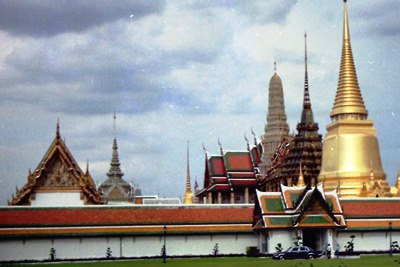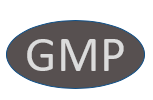
Eyewitness - Thailand
excerpts
Thailand has always had a special place in our memories. For me is was my first landfall in Southeast Asia. It also served as a hub for all of our travel while located in Laos. Beyond that it was where Hennie and I were legally married – and where our firstborn, Malcolm, entered the world.
Since leaving Laos we have also been back there many times, travelling long distances by train, by bus and by plane as well as in private transport. But we have never lived there…
My writings on Thailand have been limited but I have sought a few excerpts that will give some of the flavour….

As a single person, I would sometimes go alone on trips to Thailand. In Laos it was not possible to go far by road before straying into enemy-held territory, so Thailand was a popular place and we had perpetual Thai visas in case we had to make a quick exit.
On one such trip to Bangkok I had been buying up suitable Thai Christian literature to take back to Vientiane. There were books of poetry, but also John Bunyan’s classic Pilgrim’s Progress. When I went to catch my overnight sleeper back to Nongkhai on the Mekong border I took the opportunity to change travellers’ cheques in the bank at the main railway station, Hua Lampong. I needed to produce my ID so I gave my passport. I boarded the train, which left around 6.30pm, and it was not until bedding down around 10pm that I suddenly realised that, when collecting my cash, I had forgotten to take back my passport. There was no point in getting off the train at the next stop, so I had to sit it out till I arrived in Nongkhai around 5.30am, just as it was getting light. Happily, I knew where I had left my passport, so when I phoned the British Embassy around 9am I was able to tell them. They said they could retrieve it but could not promise how soon I would get it and that it might be late the following afternoon.
So, what could I do to pass the time in Nongkhai? My first idea was to catch up with writing postcards to family and friends, so I bought ten and set to work. “Dear Mum and Dad…”, “Dear Grandma…”, etc. It soon got boring – depressing, in fact – as I was stuck in a place where I did not want to be, and there was nothing I could do about it. It was the same kind of feeling that I had in Seoul, Korea, many years later, when flights to Europe were cancelled due to the Icelandic volcano erupting.
Then I had an idea. I would go and chat with the monks in the nearby Buddhist temple. This was a great way of practising my Thai/Isaan/Lao, since the languages are very similar. It was also very easy to get a hearing as the monks enjoyed meeting foreigners, especially those who wanted to speak their language.
It worked. We had a great time, and I even went off to eat with them in a nearby noodle shop. The monks provided the three-wheeled samlor (tricycle taxi) and I paid for the food. I started talking about my books too, and Pilgrim’s Progress. They were interested.
But where should I stay that night? My money was running out, and I had no passport to change travellers’ cheques. Happily, the abbot of the temple (it was a teaching temple with many novices) heard about me and invited me over for the evening to have some conversation. We agreed to discuss comparative religion – Buddhism and Christianity – but it ended up with him asking most of the questions and me doing my best to explain.
After about three hours of dialogue it was time for bed, and he graciously gave me a room and a key to his private bathroom. I slept quite well until it was time for breakfast. Here the fun began, as I took my turn with the novices to eat the leftovers of what the monks had been out collecting in their bowls that morning – along the streets. It was not particularly appetising: dried up rice and leftover bits of egg. But the deeper thought troubling me was whether this constituted ‘meat offered to idols’? Or perhaps the Elijah analogy was better, except they were not ravens. Anyhow, I was thankful. I was also much relieved when the afternoon train arrived from Bangkok, bringing with it my passport and enabling me to get home before the weekend set in. (p. 30)
The Guest House was also extremely noisy, with missionaries constantly coming and going. Moreover, Malcolm was having difficulty getting to sleep, and we were on a steep learning curve as new parents. New arrivals, especially from Cambodia, were telling chilling stories, and shared with us some of the Cambodian banknotes that they found blowing down the streets of Phnom Penh. One family had done much to help orphans; their stories moved us to tears. Then there were the trips to Don Muang airport to say goodbye to departing colleagues. Would we ever see them again?
As we sat in our room, we gave thanks to God for what we had. It wasn’t much, but it was all we owned now. In reality, we had all that we needed – each other, baby Malcolm, and Jesus.
It was only then that the big question hit us: what now? We had gained a wonderful new baby, but had lost almost everything else – our work, our home and many of our possessions, including our wedding gifts. Also, my support from the International Church in Vientiane had evaporated. What money we had in the Banque d’Indochine in Vientiane was now out of reach.
Hennie and Malcolm had tickets to go to Holland provided through C&MA’s Dutch office, but we did not have enough funds available to buy a ticket for me. Happily, Hennie had some good contacts in Holland and was able to find funds from Open Doors. However, this would take a while to process, and there were still things I needed to do once Hennie and Malcolm had left. (pp. 47-8)
While in Bangkok, I also made contact with Eric Parsons, the interim director of FEBC Thailand. He was interested in visiting the Cambodian refugee camps in the southeast corner of Thailand. Word had reached him that the family members of Kheam Nuy, FEBC’s Khmer broadcaster in Manila, were coming out to Pong Nam Ron camp near Chanthaburi. It was now June 1975, and heart-rending accounts of what was happening in Cambodia were beginning to trickle through.
As Eric and I arrived at the border, we encountered a tragic scene: refugees, the first of countless thousands who would arrive in Thailand over the next few years. The mood was sombre but expectant: I remember one family group arriving pushing their vehicle, which had run out of fuel. We found Pastor Kong, Kheam Nuy’s father, and his family, who had walked all the way across Cambodia from Phnom Penh in the southeast to the Thai border in the west. They told of the hundreds of people on the road, struggling to carry what they could and coping with fatigue, sickness and lack of food. Their hardship was tempered by their joy at finding freedom and the start of a new life without fear. Pastor Kong and his wife were losing no time in providing pastoral care among the refugees and holding services.
The pathos of seeing so many dejected people standing in line to be fed is something I can never forget. Shock and bewilderment hung in the air. One everyone’s mind was the question of what kind of future lay ahead. Would they ever be able to go back? (p. 49)
